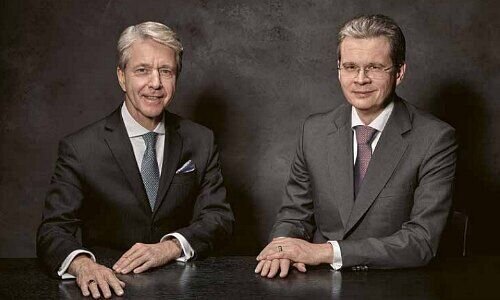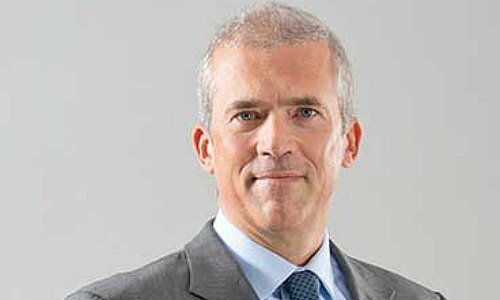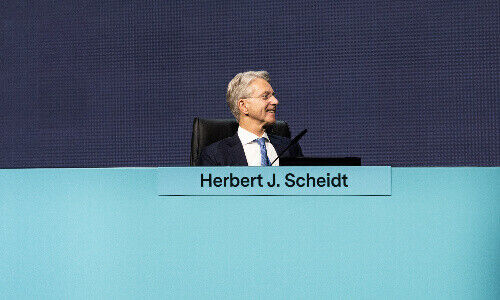Herbert J. Scheidt – Going From 13 to 75
He was told he was too unconventional for banking but he still made it to the top. Now he is retiring after 40 years in the industry. What has he achieved?
Herbert J. Scheidt, a German citizen, isn't your typical Swiss banker, yet he has done more for the country's finance hub than many of his colleagues. And he did so without much fanfare, unlike countless other bank CEOs, some of whom gleefully basked in their appointed 15 minutes of fame after becoming «Banker of the Year» or something similar.
Yesterday, he handed over the baton of Vontobel chairman to his designated successor Andreas Utermann during this year's annual general meeting for the Swiss investment house. It is the start of a new era - and the end of a very fruitful one. Scheidt has been there exactly 20 years. He was CEO until 2011 and chairman after that. There are very few other bankers who can look back on that kind of track record.
Bad, Very Bad
This is all remarkable in that Scheidt did not even want to become a banker, as he indicated in an interview with finews.com last year. He originally planned to be a development economist, even making it as high as assistant director of the World Food Program in Rome.
But after the U.S. government sharply cut UN project funding in the 1980s, he returned with his family to the Ruhr Valley. He was hired by Deutsche Bank where they told him: «You seem pretty unconventional. But let's see how it works out.»
It is thanks to Deutsche Bank that he subsequently made it to Switzerland to head up the international private banking business in Geneva in 1996. As time passed it became increasingly clear that wealth management was simply seen by the dominant investment bank business as just another distribution channel. He looked for a new job and found one at Vontobel at the start of the millennium. At the time, many Swiss bankers were probably asking themselves why he even went there.
Vontobel was doing badly, very badly.
Knocked the Inkwell Over
The traditional financial institute had bitten more than it could chew in the euphoria of the new economy of the 1990s. It had its hands more than full with IPOs and related trading activities. Scheidt looks back on that time saying: «Vontobel's name was actually better than what was inside.» Just taking a look at the share price at the time would have been enough. It was at 13 Swiss francs.
When he first presented himself in front of the board he told them, «Our organization structure looks like someone knocked the inkwell over», says a member who was present. Scheidt took a look at the organizational chart and created three clear areas with specific heads (Private Banking, Investment Banking, and Asset Management).
Uli Hoeness, Pierin Vincenz, Zeno Staub
He not only created a solid base for the bank but one that could withstand all the problems that Vontobel was not in a position to avoid, such as untaxed German assets, which the bank was then fined for. The was also an embarrassing affair with the extremely corrupt honorary chairman of the Bayern Munich football club Uli Hoeness. Add to that the constantly fluctuating partnerships with Raiffeisen cooperatives then led by Pierin Vincenz.

When Scheidt gave up the CEO post to Zeno Staub (pictured above, right) in 2011, it was an astute move. He unwittingly created the conditions for the bank to master the more or less permanent waves of consolidation in the market. Scheidt and Staub were under constant criticism for acting slowly, but Vontobel developed a strong instinct for takeovers as the years passed, whether related to Commerzbank (Switzerland), Notenstein La Roche private bank, or Finter Bank.
He even bought extremely successful stakes overseas, including Twenty Four Asset Management.
Caught by Surprise
Scheidt's soft tone but stubborn persistence has paid dividends for Vontobel in many ways. He even became the chairman of the Swiss Banker's Association succeeding Patrick Odier, which caught many Swiss bankers by surprise. They could not believe that a German was heading an association of domestic banks even if he had been a Swiss citizen for many years.
He broke up the association's obsolete structures, a bitter pill for some. He made some enemies and his efforts resulted in the Raiffeisen banks stepping out of the association.
Scheidt wanted Swiss banking to show pride to the outside world, which was something his domestically oriented colleagues also had difficulties with. But the bottom line is that he did more for Swiss finance than anyone can see on the surface.
Vontobel, Like Amazon And Apple
His largest coup is the long-term vision he had to turn Vontobel into an investment house, something that happened in 2019 when he boiled everything down to a single point: «We have to react in a world that is changing so much, both socially and economically, because of digitalization. Clients expect a banking service that is like what they get from Amazon or Apple. Clients are no longer coming because of banking secrecy but because they are looking for first-class investment solutions. Investments mean the same thing to a bank that an engine means to Mercedes.»

That also explains the catchphrase «investing is the new saving» that CEO Staub happily repeated throughout the country. Naturally, such deep-reaching re-organizations cause collateral damage, and many long-term employees left the bank because of the changes. But none of it has had an impact on Vontobel's significance and reputation. Just the opposite. The new chairman, Utermann (image above), takes over an institute that has come out of two long pandemic-ridden years strengthened.
Now an Investment Tech
What does Scheidt call today's Vontobel? «We are by definition a bank as long as we hold client assets. But from our infrastructure, we are an investment tech.» The results of the past 20 years are very clear to him. The level of assets under management has risen more than five-fold to 244 billion Swiss francs in 2021 from 45 billion in 2002, with 58 percent of the total coming from international clients.
That has created an equity capital base that has far more than doubled to over 2 billion francs in the last two decades. The number of employees has increased to more than 2,100 from 940 over the same period and now comprises more than 50 nationalities.
And Vontobel's share price has gone from 13 to 75. Not bad given he thought he had ended up in completely the wrong place on his first day on the job.




















